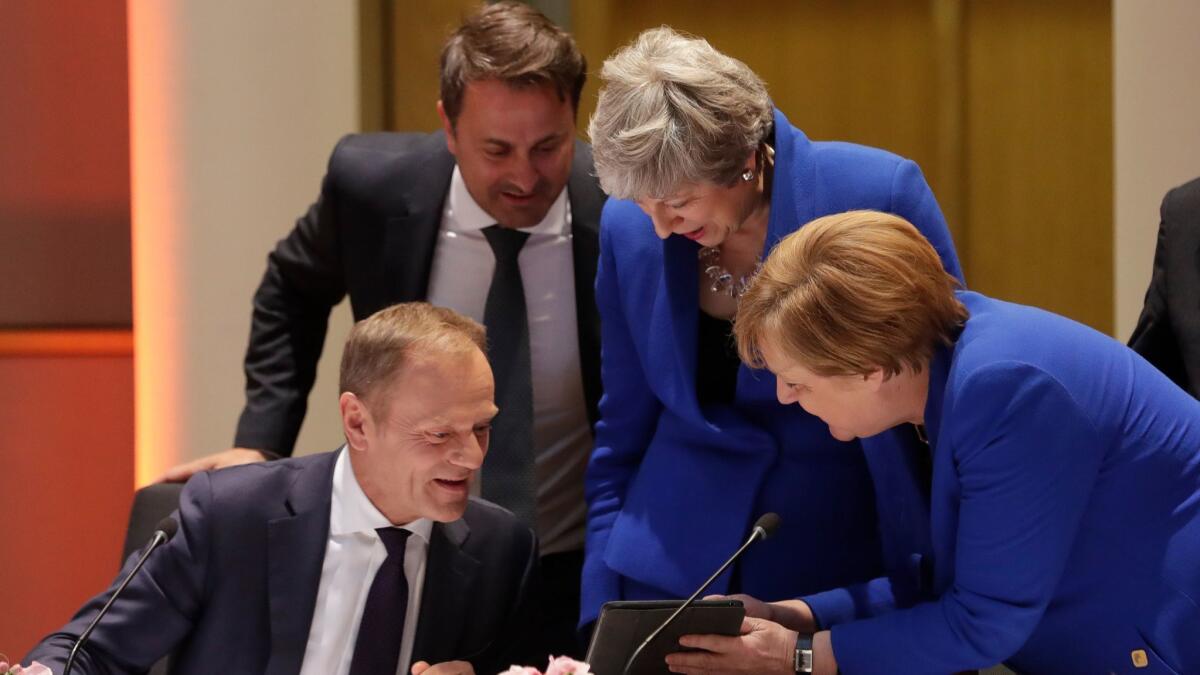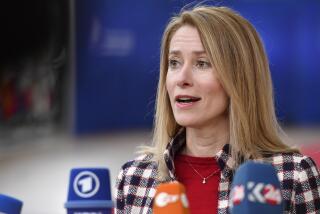European Union leaders and Britain agree on another Brexit extension, until Halloween

- Share via
Reporting from Brussels — European Union leaders and Britain early Thursday agreed to a Brexit extension that will allow the U.K. to delay its departure from the bloc until Halloween.
Leaders of the 27 remaining EU member states met for more than six hours before agreeing after midnight to postpone Britain’s exit until Oct. 31.
European Council President Donald Tusk presented the offer to British Prime Minister Theresa May, who had asked for a delay only until June 30.
Tusk said in a tweet that May had agreed to the longer “flexible” extension, which means Britain can leave before October if it ratifies a withdrawal deal with the EU.
“This means additional six months for the UK to find the best possible solution,” Tusk wrote.
EU leaders spent a long dinner meeting Wednesday wrangling over whether to save Britain from a precipitous and potentially calamitous Brexit, or to give the foot-dragging departing nation a shove over the edge.
May had asked the 27 other EU leaders at an emergency summit to delay Britain’s exit, due on Friday, until June 30 while Britain sorts out the mess that Brexit has become.
Some were sympathetic, but French President Emmanuel Macron struck a warning note.
“Nothing is decided,” Macron said, insisting on “clarity” from May about what Britain wants.
“What’s indispensable is that nothing should compromise the European project in the months to come,” he said.
At a pre-dinner meeting in Brussels, May made the case for the delay. She believes that a June 30 deadline is enough time for Britain’s Parliament to ratify a Brexit deal and pass the legislation needed for a smooth Brexit.
But British lawmakers have rejected her divorce deal three times, and attempts to forge a compromise with her political opponents have yet to bear fruit.
May spoke to the EU leaders for just over an hour, before they met for dinner without her to decide Britain’s fate. In contrast to some testy recent summits, there were signs of warmth and even humor.
May and German Chancellor Angela Merkel were filmed laughing over a tablet bearing an image of the two speaking to their respective parliaments on Wednesday, wearing similar blue jackets.
Many leaders said they were inclined to grant a Brexit delay, though they suggested a longer delay would probably be needed, given the depth of Britain’s political disarray.
Luxembourg Prime Minister Xavier Bettel said he hoped for “an intelligent extension.”
May signaled she would accept a longer extension, as long as it allowed Britain to leave early should it end its Brexit impasse.
“What is important is that any extension enables us to leave at the point at which we ratify the withdrawal agreement,” May said as she arrived in Brussels.
She added that she was hopeful it could be as soon as May 22 — a key date because that would avoid the need for Britain to participate in elections for the European Parliament.
Several months have passed since May and the EU struck a deal laying out the terms of Britain’s departure and the outline of future relations. All that was needed was ratification by the British and European parliaments.
But British lawmakers rejected it — three times. As Britain’s departure date of March 29 approached with no resolution in sight, the EU gave Britain until Friday to approve a withdrawal plan, change course and seek a further delay to Brexit, or crash out of the EU with no deal to cushion the shock.
Without an extension, Britain would have left the bloc Friday with no deal unless it canceled Brexit independently.
Economists and business leaders warn that a no-deal Brexit would lead to huge disruptions in trade and travel, with tariffs and customs checks causing gridlock at British ports and possible shortages of goods.
A disorderly Brexit would hurt EU nations, as well as Britain, and all want to avoid it.
Macron, in particular, has become increasingly exasperated with the political division and uncertainty in Britain, and laid out conditions for agreeing to a new delay. They included a “credible prospect” of some kind of solution to the British political deadlock, a promise that Britain won’t keep asking for more delays, and guarantees that Britain would not be involved in future EU decisions while its Brexit drama is playing out.
More to Read
Sign up for Essential California
The most important California stories and recommendations in your inbox every morning.
You may occasionally receive promotional content from the Los Angeles Times.













